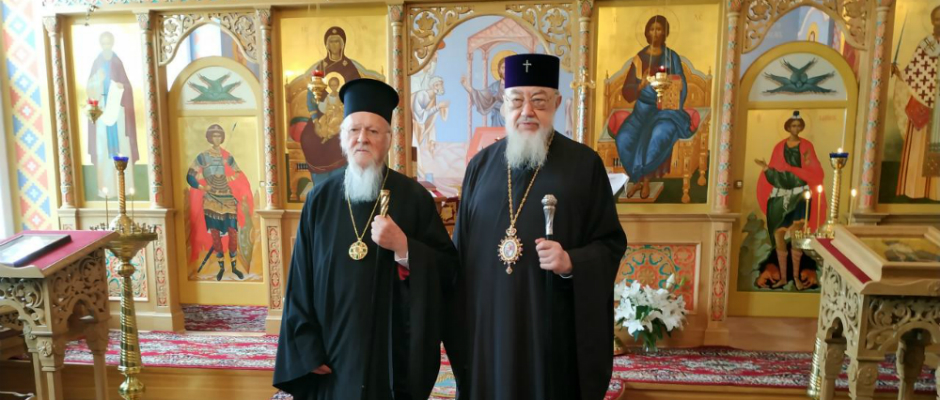 The Ecumenical Patriarchate announces that the President of the Republic of Poland, His Excellency Andrzej Duda, has officially invited His All-Holiness Ecumenical Patriarch Bartholomew to visit his homeland in order to bless, console and strengthen the countless refugees taking shelter in the country following the outbreak of war in Ukraine.His All-Holiness, having also received a similar invitation from the Primate of the Orthodox Church of Poland, His Beatitude Metropolitan Sawa of Warsaw, intends to accept and visit the temporary refugee shelters there, accompanied by His Eminence Elder Metropolitan Emmanuel of Chalcedon and the V. Rev. Grand Syncellus Iakovos Krochak.
The Ecumenical Patriarchate announces that the President of the Republic of Poland, His Excellency Andrzej Duda, has officially invited His All-Holiness Ecumenical Patriarch Bartholomew to visit his homeland in order to bless, console and strengthen the countless refugees taking shelter in the country following the outbreak of war in Ukraine.His All-Holiness, having also received a similar invitation from the Primate of the Orthodox Church of Poland, His Beatitude Metropolitan Sawa of Warsaw, intends to accept and visit the temporary refugee shelters there, accompanied by His Eminence Elder Metropolitan Emmanuel of Chalcedon and the V. Rev. Grand Syncellus Iakovos Krochak.
The Sunday of Orthodoxy at the Ecumenical Patriarchate
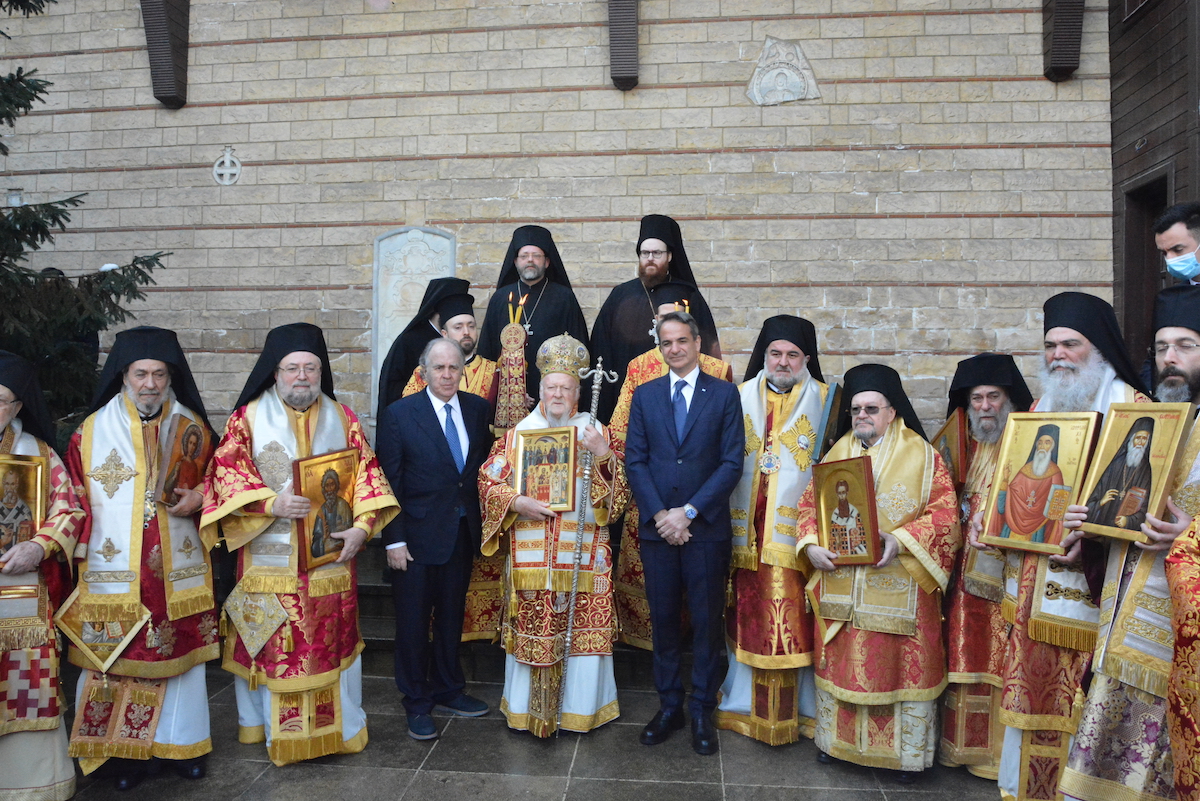 The Sunday of Orthodoxy was celebrated with all solemnity due to the centuries-old tradition on 13 March, 2022, at the Phanar in the presence of the Prime Minister of Greece Mr. Kyriakou Mitsotakis. The Divine Liturgy was preceded by His All-Holiness the Ecumenical Patriarch Bartholomew, assisted by theirs Eminences Elder Metropolitan Demetrios of the Princes’ Islands, Archbishop Nektarios of Anthidonos, Representative of the Holy Sepulcher in Constantinople, and Metropolitans Seraphim of Sevastia, Irinaios of Myriophytos and Peristasis, Chrysostomos of Myra, Nikandros of Irinopolis, Polykarpos of Italy, Amphilochios of Adrianopolis, Gerasimos Petra and Cheronissos and Andreas of Saranta Ekklisies. During the celebration, the monk Barnabas was ordained a deacon from the Monastery of the Holy Patriarchal and Stavropegial Monastery of Saint John the Baptist in Essex (Great Britain). The solemn homily was pronounced by His Eminence Archbishop Nikitas of Thyateira and Great Britain.
The Sunday of Orthodoxy was celebrated with all solemnity due to the centuries-old tradition on 13 March, 2022, at the Phanar in the presence of the Prime Minister of Greece Mr. Kyriakou Mitsotakis. The Divine Liturgy was preceded by His All-Holiness the Ecumenical Patriarch Bartholomew, assisted by theirs Eminences Elder Metropolitan Demetrios of the Princes’ Islands, Archbishop Nektarios of Anthidonos, Representative of the Holy Sepulcher in Constantinople, and Metropolitans Seraphim of Sevastia, Irinaios of Myriophytos and Peristasis, Chrysostomos of Myra, Nikandros of Irinopolis, Polykarpos of Italy, Amphilochios of Adrianopolis, Gerasimos Petra and Cheronissos and Andreas of Saranta Ekklisies. During the celebration, the monk Barnabas was ordained a deacon from the Monastery of the Holy Patriarchal and Stavropegial Monastery of Saint John the Baptist in Essex (Great Britain). The solemn homily was pronounced by His Eminence Archbishop Nikitas of Thyateira and Great Britain.
Hierarchs of the Ecumenical Throne, clergy, monks of Mount Athos and Archons of the Great Church of Christ were also present as well as the Ambassador of Greece to Turkey and members of the official Delegation that accompanied the Prime Minister of Greece, the Consuls General of Greece and Ukraine in Istanbul and many believers from the city and abroad.
Prior to the ordination of the new deacon, the Ecumenical Patriarch, in his speech, referred to the tragic events unfolding in Ukraine and called for an immediate end to the invasion and war and for a new opportunity for dialogue. At the end of the Divine Liturgy, His All-Holiness with the collaborating Hierarchs performed the established memorial prayer for the rest of the souls of all “those who fought for the Orthodox faith and died in it”. In a short greeting to the Prime Minister of Greece, His Holiness warmly welcomed him to the see of the First Throne of Orthodoxy, and in his person thanked the Greek State for its continued interest in the issues of the Ecumenical Patriarchate. He wished him a successful upcoming meeting with the President of the Republic of Turkey, and again referring to the dramatic situation in Ukraine, reiterated the support of the Ecumenical Patriarchate to the agressed Ukrainian people. The procession of the Holy Icons followed in the courtyard of the Patriarchate during which the Ecumenical Patriarch blessed the faithful.
Ecumenical Patriarch Bartholomew: End the war now!
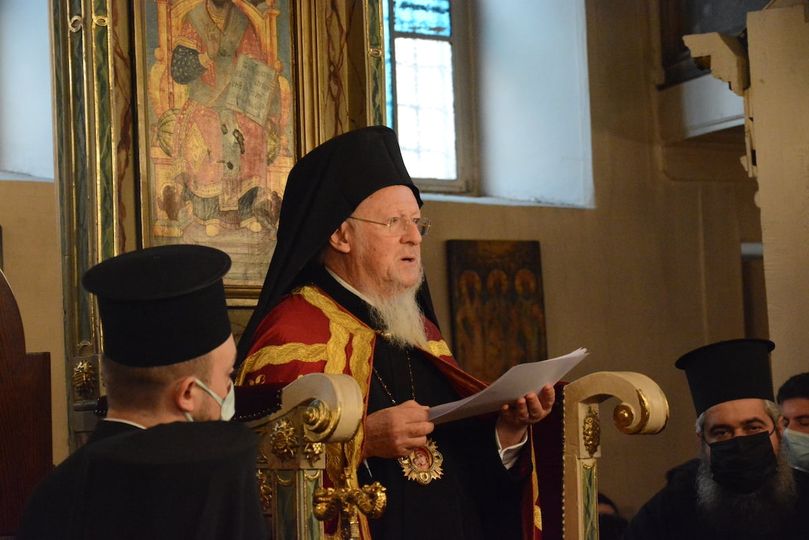 Statement by His All-Holiness Ecumenical Patriarch Bartholomew about the War in Ukraine
Statement by His All-Holiness Ecumenical Patriarch Bartholomew about the War in Ukraine
(Sunday, February 27th, 2022)
Even in the most unfavorable circumstances, such as today, where the world community is following with horror Russia’s, beyond every sense of law and morality, military attack and unprovoked invasion of Ukraine, an independent and sovereign state, or perhaps even more so now as the fiercest conflict since the time of World War II unfolds in Europe, in our neighborhood, we direct our prayers to the Lord Jesus, the Ruler of peace, asking Him with a fervent soul that He “will give strength to His people” and “bless His people with peace” (cf. Psalm 27:11). The Holy Great Church of Christ unceasingly chants the angelic hymn throughout the ages: “peace on earth and good will to men.”
Indeed, during the last few days, a tragic humanitarian catastrophe is unfolding in Ukraine. A war, which, like any war, is an abominable and reprehensible situation. It is the domination of irrationality over reason, hatred over love, darkness over light, death over life.
Again, from this position, we address another plea to end the war now! To immediately stop any act of violence, anything that spreads pain and death. Let reason prevail, love for fellow human beings, reconciliation and solidarity, the light of the Risen Christ, the gift of life.
We express our full sympathy to our brother, the Primate of the Church of Ukraine, His Beatitude Metropolitan Epiphanios of Kyiv, and our unwavering support to all the seriously suffering Ukrainian people, who have a deep faith in God and chose to live freely and to determine their own lives, as every nation deserves. Although, unfortunately, some have come, these days, to the point of questioning even their historical and national existence.
Our thoughts are constantly with the wounded and with the families of the innocent victims, irrespective of their ethnic identity, and we pray for the rest of their souls to the Lord of Life and Death. We are certain that the Lord will hear our prayers and will not abandon his beloved children in Ukraine.
The Ecumenical Patriarch condemns the unprovoked Russian invasion of Ukraine and expresses His solidarity to the suffering Ukrainian people
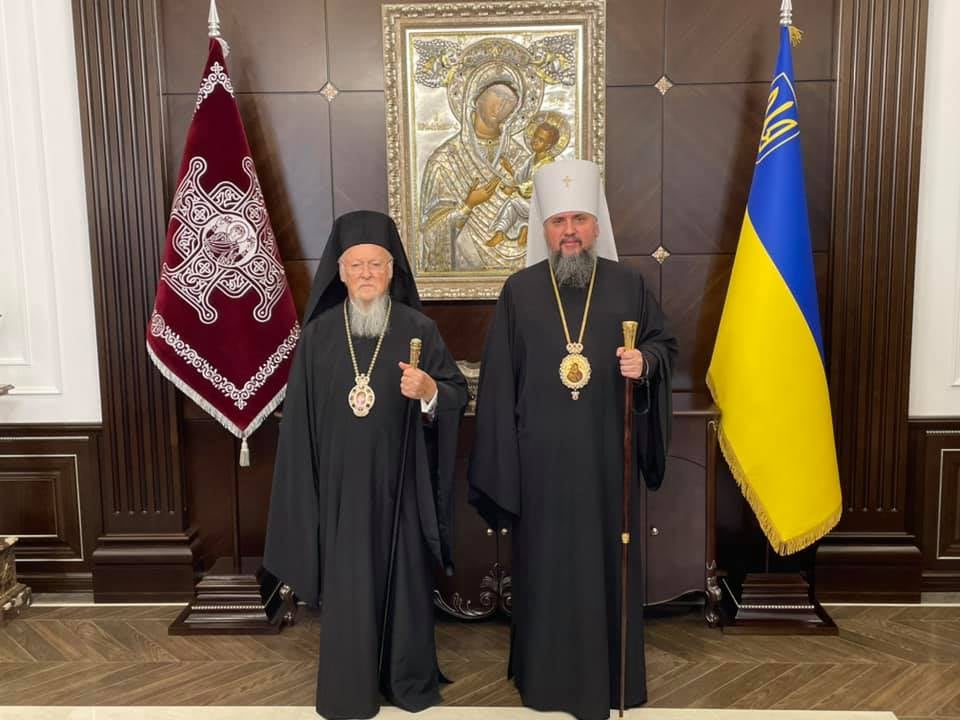 Shocked by the invasion of the armed forces of the Russian Federation in the territory of Ukraine this morning, His All-Holiness Ecumenical Patriarch Bartholomew telephoned His Beatitude Metropolitan Epiphanios, Primate of the Orthodox Church of Ukraine, expressing his deep sorrow at this blatant violation of any notion of international law and legality, as well as his support to the Ukrainian people struggling “for God and country” and to the families of innocent victims.
Shocked by the invasion of the armed forces of the Russian Federation in the territory of Ukraine this morning, His All-Holiness Ecumenical Patriarch Bartholomew telephoned His Beatitude Metropolitan Epiphanios, Primate of the Orthodox Church of Ukraine, expressing his deep sorrow at this blatant violation of any notion of international law and legality, as well as his support to the Ukrainian people struggling “for God and country” and to the families of innocent victims.
His All-Holiness condemns this unprovoked attack by Russia against Ukraine, an independent and sovereign state of Europe, as well as the violation of human rights and the brutal violence against our fellow human beings and, above all, against civilians. He prays to the God of love and peace to enlighten the leadership of the Russian Federation in order to understand the tragic consequences of its decisions and actions, which can even be the trigger for a global military conflict. He calls on the leaders of all states, European institutions and international organizations to work for a peaceful settlement of this critical situation through candid dialogue, which is the only means of resolving any problem and facing any challenge.
The Ecumenical Patriarch fraternally calls on the Local Orthodox Churches, as well as all Christians, but also every person of goodwill, in unceasing prayer for the Ukrainian people and for the prevalence of peace and justice in Ukraine.
Call for Peace in Ukraine from the Ecumenical Patriarch
 On February 13, 2022, His All-HolinessEcumenical Patriarch Bartholomew, after the Divine Liturgy for the Sunday of the Publican and the Pharisee, made the following call for peace in Ukraine:
On February 13, 2022, His All-HolinessEcumenical Patriarch Bartholomew, after the Divine Liturgy for the Sunday of the Publican and the Pharisee, made the following call for peace in Ukraine:
Honorable Consuls General, Beloved children in the Lord,
On this Sunday, dedicated to the parable of the Publican and the Pharisee, marking the entrance to a period of penitence, fasting and ascetical struggles as preparation for the Holy and Great Pascha, we are called to fervent prayer with all our hearts for the preservation of peace in Ukraine. Indeed, the possibility of a new war in Europe, resulting from the escalation of violent rhetoric and militarization of the borders between Russia and Ukraine, should be unequivocally opposed. We call for enduring peace, stability and justice in the region. Peace is a matter of choice and must be shared by all the forces engaged in this extremely complex and sensitive geopolitical context. The duty of us all is to pray for and actively contribute to a peaceful resolution of conflict situations and to the unconditional respect and protection of human rights and dignity. Human conflict may very well be inevitable in this fallen and broken world; but war and violence are certainly to be opposed with every fiber of our being.
The ancient Greeks spoke about “peace” (“εἰρήνη”) as a condition “exceedingly rich and immensely fruitful” (“βαθύπλουτος καὶ βαθύκαρπος”). They adored peace as a goddess, depicted with her son Plutos (“Wealth”) in her bosom. Closer to our times, Benjamin Franklin reminded us that “there never was a good war or a bad peace.” War can appear sweet only to those who have not experienced it (“γλυκὺ δὲ πόλεμος ἀπείροισιν”). Indeed, if we allow our hearts and minds to freely express themselves, without any fear or passion, they will certainly not speak in favor of war, but they will unequivocally praise peace.
We firmly believe that there is no solution possible to preserve and guarantee peace outside the path of dialogue, which abolishes the conditions that lead to violence and war. Peace comes from mutual respect and cooperation. Within an environment of growing uncertainty with regard to human affairs, the word of the Church has to be a clear message of reconciliation and peace, of love and justice, of brotherhood and solidarity.
We call upon all parties involved to pursue this path of dialogue and respect for international law, in order to bring an end to the conflict and allow all Ukrainians to live in harmony. Arms are not the solution. On the contrary, they can only promise war and violence, sorrow and death. As our beloved brother Francis, the Pope of Rome, recently said: “Let us not forget: war is madness.” All Church ministers, all representatives of religious traditions, all those in position of authority, all people of good will, each one of us, should call for a peaceful resolution of this dangerous escalation of words and means that weight heavily and ominously upon the head of the Ukrainian people. Silence and indifference are not an option. There is no peace without constant vigilance. Therefore, we are all “sentenced” to peace, which means, destined to the permanent struggle for its establishment and defense.
May the God of love and peace bless you all!
Celebration of the 1920 Encyclical of the Ecumenical Patriarchate “Unto the Churches of Christ Everywhere”
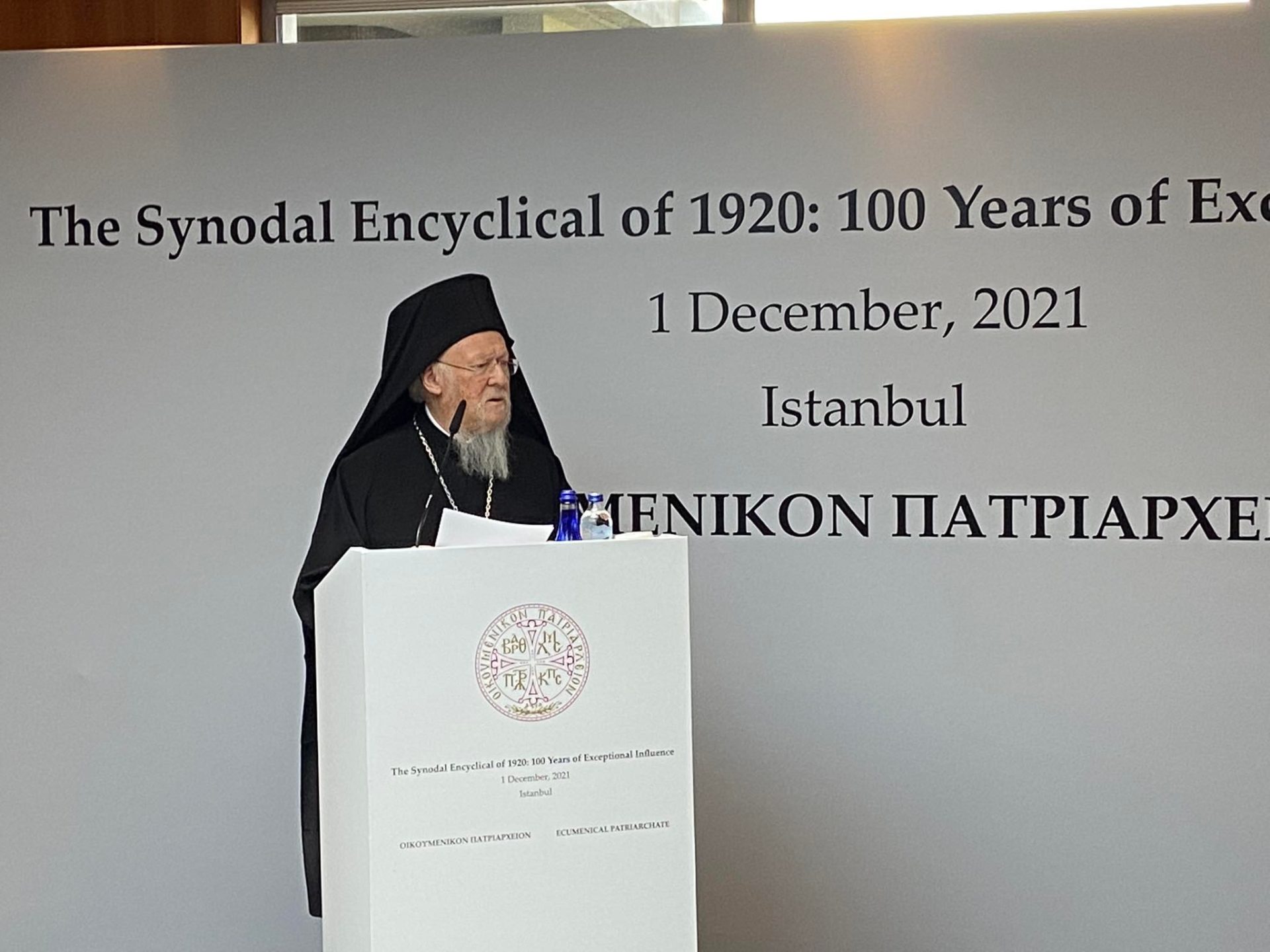 Under the title “The Synodal Encyclical of 1920: 100 Years of Exceptional Influence,” the Ecumenical Patriarchate celebrated, on 1 December 2021, one of the most important ecumenical documents of the 20th century. The conference was originally scheduled to take place last year, on the 100th anniversary of the publication of the Encyclical but was postponed due to severe restrictive measures against the pandemic.
Under the title “The Synodal Encyclical of 1920: 100 Years of Exceptional Influence,” the Ecumenical Patriarchate celebrated, on 1 December 2021, one of the most important ecumenical documents of the 20th century. The conference was originally scheduled to take place last year, on the 100th anniversary of the publication of the Encyclical but was postponed due to severe restrictive measures against the pandemic.
A few years before his death, Dr Willem Visser ‘t Hooft, the first general secretary of the World Council of Churches (WCC), had dedicated the first chapter of his book “The Genesis and Formation of the World Council of Churches” to this historical document, recognizing its foundational character in the history of the WCC.
The opening session was attended by the Patriarch of the Armenians in Turkey, representatives of the Pontifical Council of Christian Unity, the acting general secretary of the WCC, the president of the Conference of European Churches, hierarchs of the Ecumenical Patriarchate and the Churches of Cyprus and Greece, diplomats and official guests.
In his opening speech, His All-Holiness Ecumenical Patriarch Bartholomew characterized the Encyclical as an axial text in the history of the ecumenical movement. He particularly insisted on the fact that the Encyclical was drafted by members of the faculty of the Theological School of Halki, expressing therefore the “spirit of Halki,” whose main characteristics were openness to the world and confidence in the power of dialogue. Unfortunately, the School of Halki has been closed for five decades and it is certain that the suspension of the school also affected the course of the ecumenical movement.
Continue readingThronal Feast of the Ecumenical Patriarchate
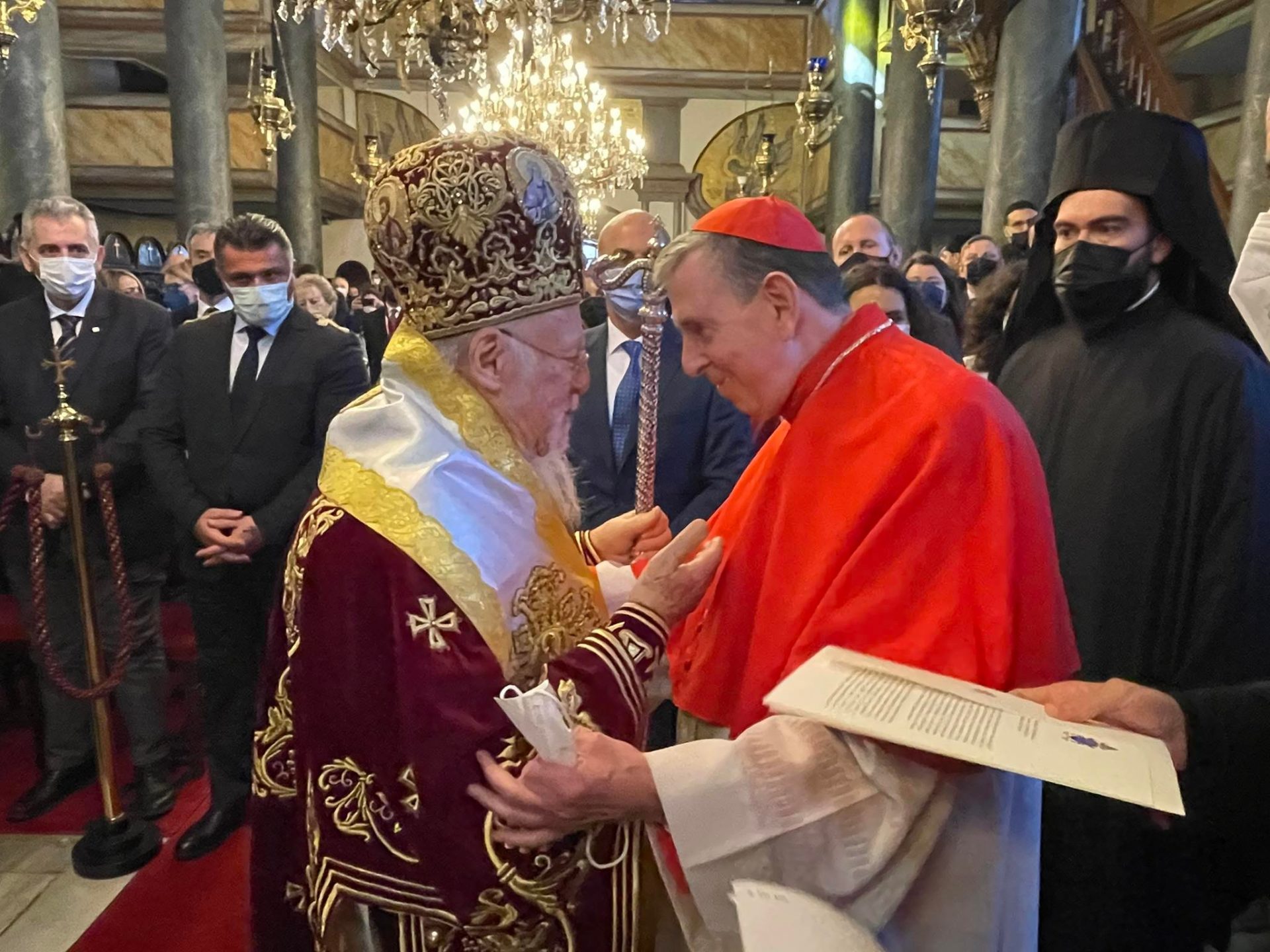 The Ecumenical Patriarchate honored the memory of its founder, the Holy Apostle Andrew the First-Called. On Tuesday 30 November 2021, a solemn Divine Liturgy was presided by His All-Holiness Ecumenical Patriarch Bartholomew in concelebration with their Eminences the Senior Metropolitans Emmanuel of Chalcedon and Dimitrios of the Princes Islands, and the Metropolitans Nektarios of Anthedon (Representative of the Patriarchate of Jerusalem), Vasilios of Constantia and Ammochostos (representing the Church of Cyprus), Meliton of Philadelphia, Seraphim of Sevasteia, Irinaios of Myriophytos and Peristasis, Chrysostomos of Myra, Naum of Rousse (Church of Bulgaria) and Amphilochios of Adrianople in the Patriarchal Church of St. George, at the Phanar. With them concelebrated as well the Rev. Prof. Dr Ioan Sauca, acting general secretary of the World Council of Churches (from the Church of Romania). The homily was preached by His Eminence Metropolitan Kyrillos of Rhodes.
The Ecumenical Patriarchate honored the memory of its founder, the Holy Apostle Andrew the First-Called. On Tuesday 30 November 2021, a solemn Divine Liturgy was presided by His All-Holiness Ecumenical Patriarch Bartholomew in concelebration with their Eminences the Senior Metropolitans Emmanuel of Chalcedon and Dimitrios of the Princes Islands, and the Metropolitans Nektarios of Anthedon (Representative of the Patriarchate of Jerusalem), Vasilios of Constantia and Ammochostos (representing the Church of Cyprus), Meliton of Philadelphia, Seraphim of Sevasteia, Irinaios of Myriophytos and Peristasis, Chrysostomos of Myra, Naum of Rousse (Church of Bulgaria) and Amphilochios of Adrianople in the Patriarchal Church of St. George, at the Phanar. With them concelebrated as well the Rev. Prof. Dr Ioan Sauca, acting general secretary of the World Council of Churches (from the Church of Romania). The homily was preached by His Eminence Metropolitan Kyrillos of Rhodes.
Were also present their Eminences the Senior Metropolitan Apostolos of Derka, Metropolitans Panteleimon of Bryoula, Dimitrios of Metra and Athyra, Theolyptos of Iconium, Eugene of Rethymnon and Aulopotamos, Polycarpos of Italy, Stephanos of Kallioupolis and Madytos, Elpidophoros of America, Joseph of Buenos Aires, Athenagoras of Kydonia, Maximos of Selybria, Gerasimos of Petras and Cheronissos, Kyrillos of Hierapytna and Siteia, Andreas of Saranta Ekklisies, Ioakim of Proussa and Job of Telmessos, and their Graces the Bishops Tikhon of Tiberioupolis (Church of Bulgaria), Adrianos of Alikarnassos, Benjamin of Tralles, Irinaios of Eumeneia and Smaragdos of Daphnousia.
The Divine Liturgy was attended by the official delegation of the Church of Rome, headed by His Eminence Cardinal Kurt Koch, President of the Pontifical Council for Promoting Christian Unity, as well as by the Undersecretary of State for Foreign Affairs of Greece Mr. Andreas Katsaniotis, representing the Greek Government together with his honorable entourage, the Deputy Minister of Education and Religions of Greece Mr. Zetta Makri, the Ambassadors of Greece and Ukraine to Ankara, Mr. Michael-Christos Diamesis and Vasyl Bodnar, the Consul General in the City Mrs. Georgia Sultanopoulou, together with her husband the Ambassador of Greece in London Mr. Ioannis Raptakis, the Consuls General of Bulgaria and Ukraine in the City Mr. Vassil Valchev and Roman Nedilskyi, members of the Greek Delegation to the Interparliamentary Assembly of Orthodoxy, the Mayors of Athens and Thessaloniki, Mr. Costas Bakogiannis and Mr. Konstantinos Zervas, as well as many faithful from the City, Greece and other countries.
At the end of the Divine Liturgy, the Ecumenical Patriarch addressed the official delegation of the Roman Catholic Church with these words:
Continue readingAn Interfaith Project for Protection and Security for Places of Worship
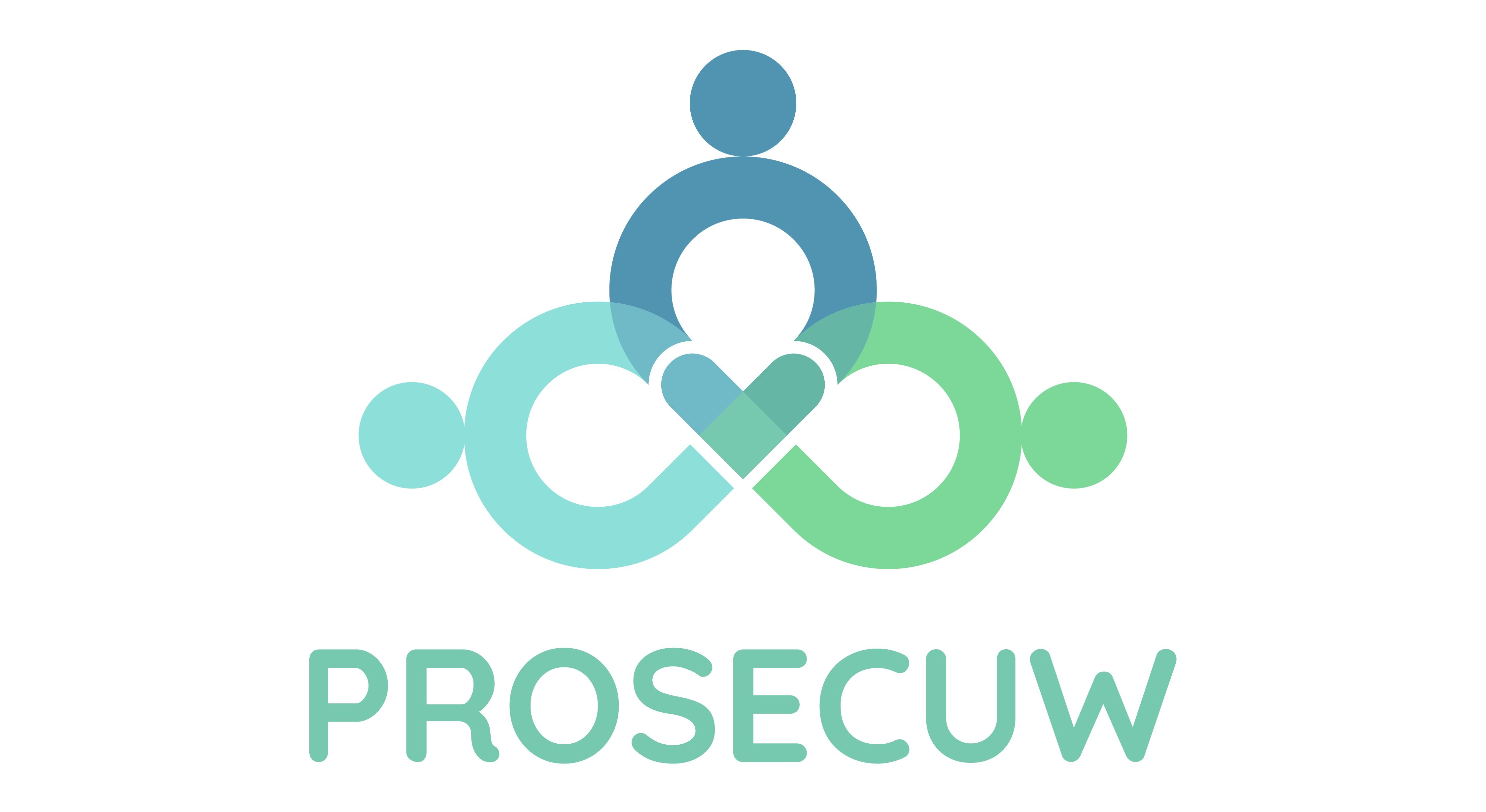 Τhe Center of Ecumenical Missiological and Environmental Studies “Metropolitan Panteleimon Papageorgiou” (CEMES), a foundation working with the blessing of His All-Holiness the Ecumenical Patriarch Bartholomew, who also inaugurated its offices at St. Theodora Monastery of Thessaloniki in 2013, is participating in the EU funded project PROSECUW (Protection and Security of Places of Worship, ISFP 2020-AG-PROTECT- Project Number: 101034232) and is working together with similar academic foundations from Cyprus, Germany and Portugal. A summary of this pioneering project is the following:
Τhe Center of Ecumenical Missiological and Environmental Studies “Metropolitan Panteleimon Papageorgiou” (CEMES), a foundation working with the blessing of His All-Holiness the Ecumenical Patriarch Bartholomew, who also inaugurated its offices at St. Theodora Monastery of Thessaloniki in 2013, is participating in the EU funded project PROSECUW (Protection and Security of Places of Worship, ISFP 2020-AG-PROTECT- Project Number: 101034232) and is working together with similar academic foundations from Cyprus, Germany and Portugal. A summary of this pioneering project is the following:
“Places of worship around Europe and the world are, according to a recent report, in increased danger in the last years due to terrorist attacks and augmentation of hate crimes. These places serve not only individuals but also families and people in need. Thus, it is essential they be able to feel safe in such places and this should be a top priority among local and national stakeholders. One of the various ways to improve protection and security in places of worship is the engagement of the community in the protection efforts.
The main objective of the project is to establish cooperation between public authorities and faith-based leaders and congregations aiming at a better understanding of, security threats, promotion of awareness-raising activities, and the creation of manuals for sharing best practices and relevant tools among EU stakeholders.
Continue readingGlobal Christian Forum’s International Committee met virtually
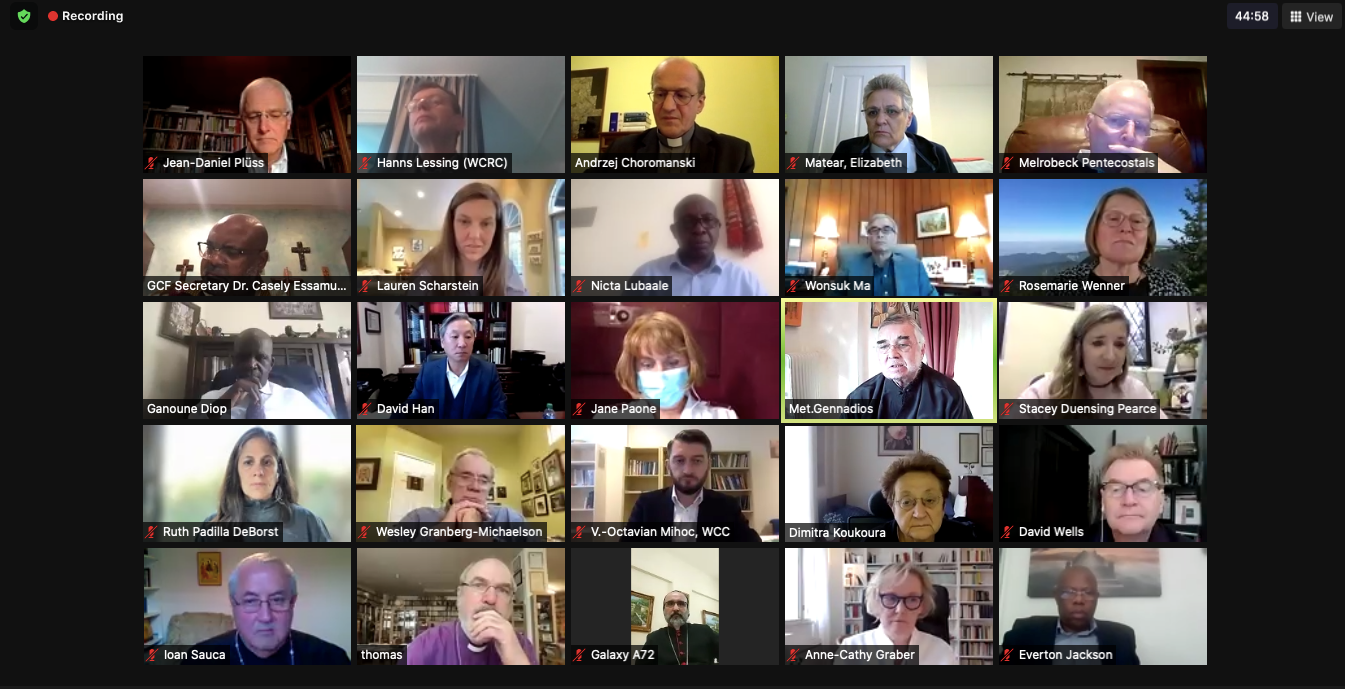 The Global Christian Forum’s International Committee met virtually on 26 October 2021. Participants joined the meeting from around the world to reflect on places they find hope and to plan for the next Global Gathering which will take place in 2024. One participant shared that he finds hope in the resurrection which assures us that evil does not have the final word; the final word belongs to God. The Committee unanimously confirmed that we will have the fourth Global Gathering the week of 15-19 April, 2024.
The Global Christian Forum’s International Committee met virtually on 26 October 2021. Participants joined the meeting from around the world to reflect on places they find hope and to plan for the next Global Gathering which will take place in 2024. One participant shared that he finds hope in the resurrection which assures us that evil does not have the final word; the final word belongs to God. The Committee unanimously confirmed that we will have the fourth Global Gathering the week of 15-19 April, 2024.
Ecumenical leaders of WCC member Churches convened to form vision in lead-up to 11th WCC Assembly
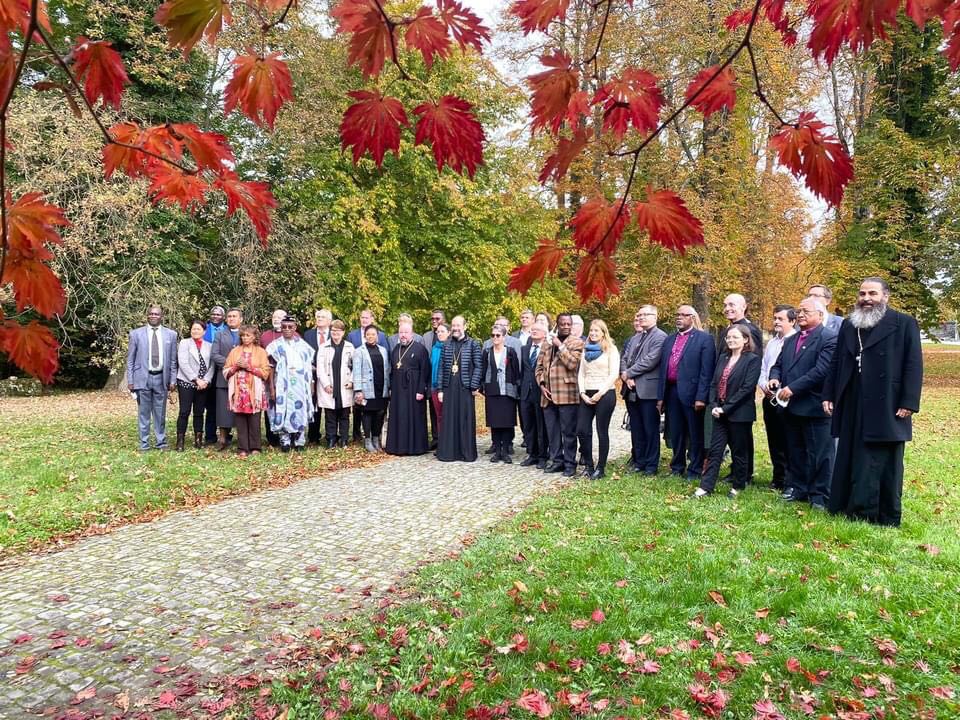 Nearly 60 ecumenical officers convened on 25-28 October 2021 at the Ecumenical Institute at Château de Bossey near Geneva, focusing on plans for the World Council of Churches (WCC) 11th Assembly in 2022 and its theme, “Christ ́s love moves the world to reconciliation and unity.” This gathering was the ecumenical officers’ largest in the lead-up to the assembly.
Nearly 60 ecumenical officers convened on 25-28 October 2021 at the Ecumenical Institute at Château de Bossey near Geneva, focusing on plans for the World Council of Churches (WCC) 11th Assembly in 2022 and its theme, “Christ ́s love moves the world to reconciliation and unity.” This gathering was the ecumenical officers’ largest in the lead-up to the assembly.
In welcoming remarks, WCC acting general secretary Rev. Prof. Dr Ioan Sauca expressed joy at the ecumenical officers being able to gather again after two years. “During the past two years we faced many questions in our different contexts about our world and the life of our churches,” Sauca said. “The world changed in ways we could not imagine.” As plans for the assembly take shape, Sauca said, these plans are undergirded with a feeling of moving forward together. “This meeting is an integral part of the process of preparation for the next assembly. We look forward to your input on the fruits of our work and the harvest we can bring to Karlsruhe,” he said. “Our world needs love, reconciliation and unity. And our fellowship is called to respond in prayer and with acts of transforming discipleship”, added Sauca.
Rev. Dr Benjamin Simon, WCC programme executive for Church relations, said that the meeting was an example of how a gathering can take place both in-person and online, and still draw people together in a genuine setting. “With 40 ecumenical officers present in Bossey—coming from all over the world—we are so grateful for face-to-face time,” said Simon. “We are equally grateful for an additional 30 ecumenical officers who are following from across the globe, because they were not able to be present due to COVID-19-related restrictions.”
Continue reading